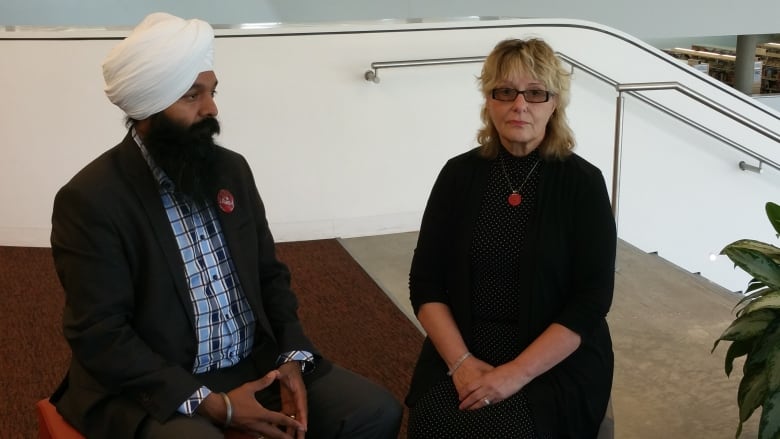Liberal MPs ask Morneau to tweak small-business tax changes
Constituents express 'quite boisterous' disapproval as caucus prepares to meet in Kelowna, B.C.

Some Liberal MPs are growing skittish as small business owners mobilize against proposals to change the tax regime, and they will tell Finance Minister Bill Morneau that his plans need a tweak to stave off an electoral backlash.
CBC News spoke to a number of MPs ahead of the national caucus meeting in Kelowna, B.C., next week; many said they would urge Morneau to alter a proposal that would end tax advantages for proprietors who hold passive investments, like stocks and real estate, in their small businesses.
Lower tax rates are meant to encourage businesses to reinvest and create jobs, not to help investors realize higher rates of return on a retirement portfolio, the government has said. Business owners maintain they rely on these tax structures because they do not have access to other supports available to income earners, like severance pay or company pension plans.
The government also wants to curtail "income sprinkling," a practice that allows owners to distribute some profits to family members in a lower tax bracket.
"In my opinion, based on a ton of discussion I've had with people in my riding, and other MPs, I think we need a mediated solution between what's being proposed and what can be done," Liberal MP Stephen Fuhr said in an interview. "We need some sort of compromise."
"Some folks don't think these proposed changes are the right way to do it, and they're quite boisterous about it. I'm definitely going to convey their opinions to the decision-makers."
'A whole bunch of nervous MPs'
Fuhr, who pried his Kelowna-Lake Country seat away from the Tories after some 50 years of Conservative representation, said the opposition is ready to pounce on marginal Liberal ridings like his that could be vulnerable in the next election.

The former RCAF pilot said Conservative Leader Andrew Scheer was in Kelowna this week to meet the local Chamber of Commerce about the changes. "I didn't get invited, which was surprising."
Dan Kelly, president of the Canadian Federation of Independent Business, a group that represents some 108,000 members, said business owners are bracing for a fight.
"I've got to tell you, I've been doing this for 20-plus years, and I haven't seen business owners this angry in an awfully long time," he said in an interview.
About 35 organizations across the country representing doctors, lawyers, farmers, financial planners, home builders, shop owners and other incorporated small businesses have created the Coalition for Small Business Tax Fairness, which they say represents tens of thousands of Canadians ready to stand against the proposed changes.
"I think there's a whole bunch of nervous MPs that are hearing from people that have otherwise been their supporters, their backers or their friends, they are very upset with the federal government. We're certainly hearing a lot of that," Kelly said.
'An all-out assault'
Pierre Poilievre, the newly minted Conservative finance critic, said taking on passive investments — a tool many rely on for retirement security — is "an all-out assault on middle class small business owners."
Randeep Sarai, the B.C. Liberal caucus chair, said 30 per cent of constituents in his Surrey Centre riding have a connection to a small business. While he says Conservative efforts to brand Liberals as anti-business are "completely baseless," he too wants to ensure his constituents aren't hit hard.

"People who have put a lot of their money — and the planning of their future — into passive income streams are relying on those for their retirement, and they have a lot of concerns. They want to make sure they won't be penalized for working hard and saving for their retirement.
"I think there will be some tweaking," he said.
Morneau dialed in to a conference call Thursday to reassure nervous MPs that the changes would not be applied retroactively, and business owners who use the system to plan for retirement wouldn't see any changes to their current nest egg. Rather, the changes would apply on investments moving forward.
Among the myths Morneau is trying to dispel is the coalition's contention that his proposals will impact all small business owners, two-thirds of whom are middle-class Canadians earning less than $73,000 per year.

Morneau contends the proposed change to passive investment income will have negligible impact on anyone making less than $144,000 per year, because they can simply plow investment dollars into their RRSP and TFSA.
"The minister will be there in Kelowna to answer any questions MPs might have; he'll be there to explain the proposals and clear up some of the misconceptions. He is absolutely available to his colleagues," Dan Lauzon, the minister's director of communications, told CBC News. "We know it's a big change, it's an important one, and we need to get it right."
Fuhr said many of his constituents bristle at the term "loopholes."
"Part of the discussion that is irritating a lot of folks is just the language," he said. "Everything that has been done up to now has been legal. It's a way that people have been minimizing their tax burden, which is completely legitimate."
One would think there will be some aspect of adjustment.— Liberal MP Francis Scarpaleggia
Liberal Quebec MP Francis Scarpaleggia, the national caucus chair, said Morneau's plan is not yet set in stone.
"We're going to have to study these changes very clearly to make sure we are achieving fairness without creating any unintended consequences," he said.
"One would think there will be some aspect of adjustment."
Morneau unveiled his proposal in mid-July and launched a 75-day consultation period. The government is expected to introduce legislation in the fall to fulfil the campaign pledge to level the playing field between business owners and wage earners.
"It's not a matter of if this needs to be done, it's how we can implement it fairly," a Finance official, speaking on background, said.
With files from the The Canadian Press

